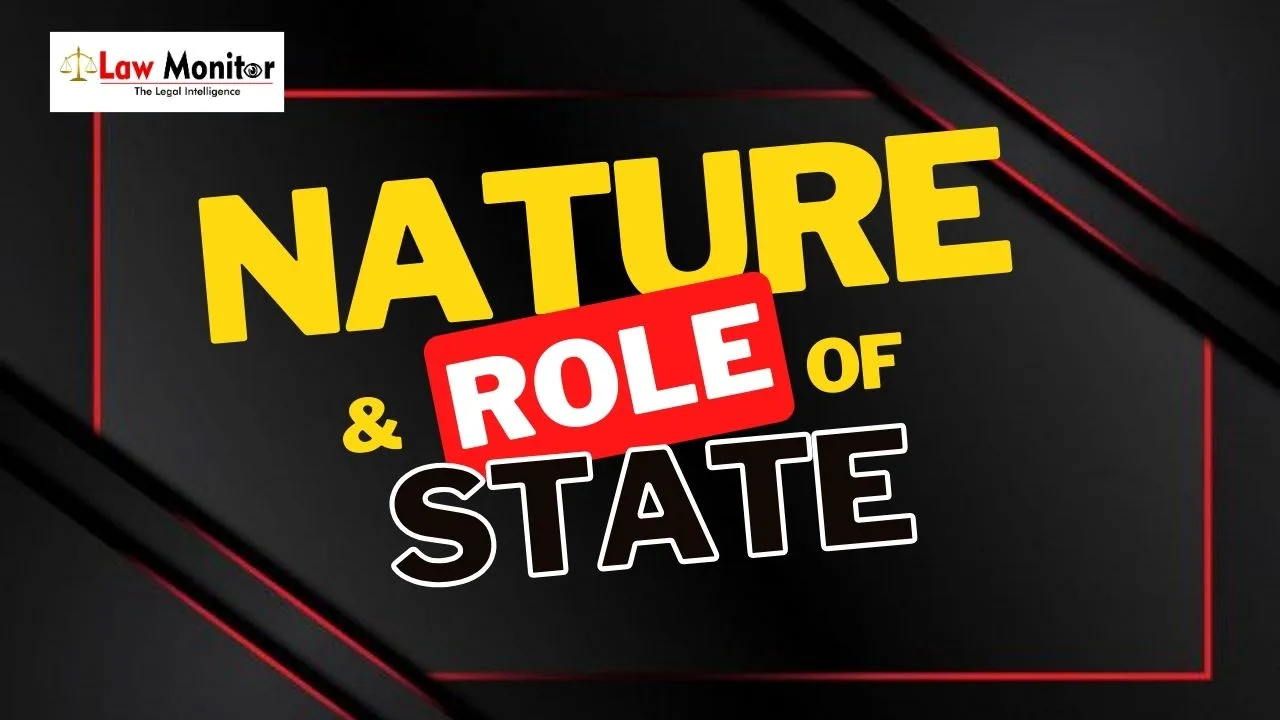Nature of the State: The state is a political entity that exercises authority and control over a specific territory and its inhabitants.
It is characterized by a legitimate monopoly on the use of force to maintain order and enforce laws.
The state typically has defined borders and a population subject to its laws and governance.
Roles of the State:
- Maintaining Law and Order:
The state establishes and enforces laws to ensure a peaceful and orderly society.
- Protecting Citizens:
The state is responsible for safeguarding the security and well-being of its citizens. This includes defense against external threats and the provision of a safe environment internally.
- Promoting Public Welfare:
States often engage in activities to enhance the general welfare of the population, such as healthcare, education, and social services.
Public policies may address poverty, unemployment, and other societal challenges.
- Economic Regulation:
The state may regulate economic activities to ensure fair competition, consumer protection, and overall economic stability.
It can also play a role in wealth distribution and addressing economic inequalities.
- Infrastructure Development:
Building and maintaining essential infrastructure, such as roads, bridges, and utilities, is a key role of the state.Infrastructure development contributes to economic growth and improves citizens’ quality of life.
- Diplomacy and International Relations:
The state engages in diplomatic relations with other nations to promote peaceful cooperation, resolve conflicts, and pursue mutual interests.
It represents its citizens on the international stage and enters into treaties and agreements.
- Legitimacy and Governance:
The state derives its authority from the consent of the governed, often through democratic processes.
It provides a framework for the establishment and functioning of governments, which are institutions that exercise authority on behalf of the state.
It maintains a system of justice to address disputes and punish unlawful behaviour.
Balance of Power:
- The nature of the state involves a balance between centralized authority and individual freedoms.
- Balancing power prevents tyranny and ensures that the state serves the best interests of its citizens.
Nature and Role of the State
- Nature of the State:
- The state is a political entity that exercises authority and control over a specific territory and its inhabitants.
- It is characterized by a legitimate monopoly on the use of force to maintain order and enforce laws.
- The state typically has defined borders and a population subject to its laws and governance.
- Roles of the State:
- Maintaining Law and Order:
- The state establishes and enforces laws to ensure a peaceful and orderly society.
- It maintains a system of justice to address disputes and punish unlawful behavior.
- Protecting Citizens:
- The state is responsible for safeguarding the security and well-being of its citizens.
- This includes defense against external threats and the provision of a safe environment internally.
- Promoting Public Welfare:
- States often engage in activities to enhance the general welfare of the population, such as healthcare, education, and social services.
- Public policies may address poverty, unemployment, and other societal challenges.
- Economic Regulation:
- The state may regulate economic activities to ensure fair competition, consumer protection, and overall economic stability.
- It can also play a role in wealth distribution and addressing economic inequalities.
- Infrastructure Development:
- Building and maintaining essential infrastructure, such as roads, bridges, and utilities, is a key role of the state.
- Infrastructure development contributes to economic growth and improves citizens’ quality of life.
- Diplomacy and International Relations:
- The state engages in diplomatic relations with other nations to promote peaceful cooperation, resolve conflicts, and pursue mutual interests.
- It represents its citizens on the international stage and enters into treaties and agreements.
- Legitimacy and Governance:
- The state derives its authority from the consent of the governed, often through democratic processes.
- It provides a framework for the establishment and functioning of governments, which are institutions that exercise authority on behalf of the state.
- Maintaining Law and Order:
- Balance of Power:
- The nature of the state involves a balance between centralized authority and individual freedoms.
- Balancing power prevents tyranny and ensures that the state serves the best interests of its citizens.
- Evolution and Adaptation:
- The nature and role of the state can evolve over time in response to societal changes, technological advancements, and global challenges.
- States may adapt their functions to address emerging issues and better meet the needs of their populations.
- The nature and role of the state can evolve over time in response to societal changes, technological advancements, and global challenges.
- States may adapt their functions to address emerging issues and better meet the needs of their populations.
Read Also:
- Differences Between State and Government, Society or Nation – Political Science Notes
- Theories of Origin of State (Part 1): Divine Theory and Force Theory
- Social Contract Theory : Theories of Origin of State (Part 2)
- Evolutionary Theory of the Origin of State and its Significance: Political Science Notes



